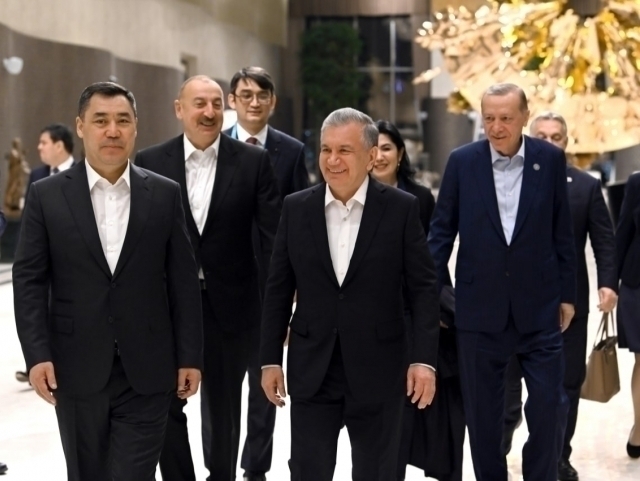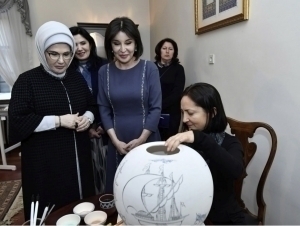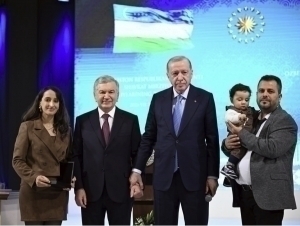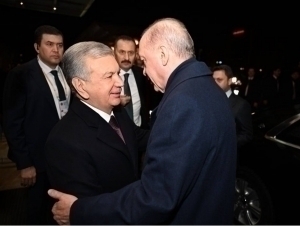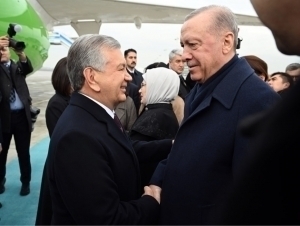Turkic States of Central Asia prioritize international law over TRNC recognition
Local
−
15 April 2025 20839 3 minutes
Kazakhstan, Kyrgyzstan, Tajikistan, Turkmenistan, and Uzbekistan have agreed not to recognize the Turkish Republic of Northern Cyprus (TRNC) in partnership with the European Union. This agreement is reflected in the declaration adopted during the first Central Asia–European Union Summit, held on April 3–4, 2025, in Samarkand.
The joint declaration, signed by President Kassym-Jomart Tokayev of Kazakhstan, President Sadyr Japarov of Kyrgyzstan, President Emomali Rahmon of Tajikistan, President Serdar Berdimuhamedov of Turkmenistan, President Shavkat Mirziyoyev of Uzbekistan, European Council President Charles Michel, European Commission President Ursula von der Leyen, and European Bank for Reconstruction and Development President Odile Renaud-Basso, emphasized respect for the sovereignty and territorial integrity of all states. It stressed adherence to international principles and refraining from actions contrary to these norms.
“In this spirit, we reaffirmed our commitment to UN Security Council Resolutions 541 (1983) and 550 (1984). Participation in regional cooperation structures must align with these international principles, critical to advancing relations between the EU and Central Asia. Turkmenistan also reiterated its adherence to its international obligations in line with its permanent neutrality status,” states Article 4 of the declaration.
What Are Resolutions 541 and 550?
The declaration indirectly referenced UN Security Council Resolutions 541 and 550, which address the situation in Cyprus.
Adopted on November 18, 1983, with 13 votes in favor, Pakistan opposing, and Jordan abstaining, this resolution condemned the TRNC's unilateral declaration of independence on November 15, 1983. It called on all states to respect the sovereignty, independence, and territorial integrity of the Republic of Cyprus and to refrain from recognizing any other government on the island.
Adopted on May 11, 1984, with a similar vote count, it condemned actions involving "exchange of ambassadors" between Turkey and Northern Cyprus, declared such separatist actions as illegal, and urged states not to recognize or assist the TRNC. It also called for respect for the Republic of Cyprus's sovereignty and a return of areas such as Varosha to UN administration.
Despite shared membership with Turkey in organizations like the Organization of Turkic States, three Central Asian members—Kazakhstan, Kyrgyzstan, and Uzbekistan—along with neutral Turkmenistan, have effectively distanced themselves from recognizing the TRNC. This reflects their commitment to international law and alignment with the EU’s policies.
The island of Cyprus has been ethnically divided since Turkey's military intervention in 1974, following a coup d'état by pro-Greek unification forces. Approximately 37% of the island's territory remains under Turkish control, forming the self-proclaimed TRNC in 1983, recognized only by Turkey. Ankara maintains a military presence of 40,000 personnel in Northern Cyprus. The southern part of the island remains under the control of the internationally recognized Republic of Cyprus, primarily inhabited by Greek Cypriots.
Northern Cyprus heavily relies on Turkey’s economic, political, and military support. It is considered an occupying power by the Republic of Cyprus and the United Nations. The TRNC holds observer status in the Organization of Turkic States and the Organization of Islamic Cooperation.
The TRNC is home to approximately 294,906 residents across 3,355 square kilometers, with ethnic Turks forming the majority. The capital, Nicosia (Lefkosa), is divided between the Republic of Cyprus and Northern Cyprus. The island's sectors are separated by a buffer zone monitored by UN peacekeeping forces.
Live
All1 fevral' kuni Rafah o'tish punkti ochiladi
30 January
